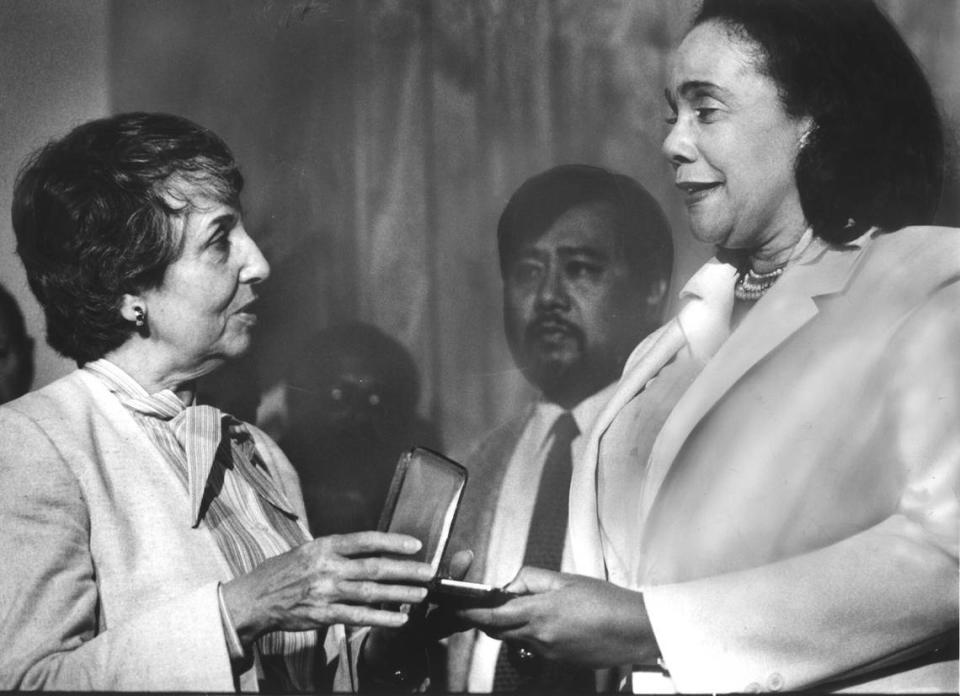How Sacramento’s support of universal health care honors the legacy of Mayor Anne Rudin

In January 1986, then-Mayor Anne Rudin made an appearance on the “Today” show to debate a top federal immigration service official over Sacramento’s sanctuary policy for Central American refugees. The trailblazing mayor, who died on Thanksgiving at age 97, threw herself into a fraught national debate and caused an uproar in her city after the appearance.
“The reason we passed this policy ... is because we feel that the federal government is not enforcing the immigration laws fairly and evenly and humanely,” Rudin told “Today” host Jane Pauley.
Hundreds of thousands of Salvadorans, Guatemalans and Nicaraguans fled north from civil war, repression and economic devastation during the 1980s. The conflicts were considered proxy battles for the Cold War. President Ronald Reagan felt that violence and communism could reach the U.S., prompting controversial foreign interventions — the effects of which are still felt in those nations.
Opinion
Many people thought Sacramento’s sanctuary policy was unnecessary or made the community less safe, a timeless trope deployed by xenophobes who get upset when refugees flee to our nation of immigrants. Still, Rudin’s appearance did not go over well in Sacramento and pressure mounted to rescind the resolution. In July, a standing-room-only crowd went berserk during a council meeting and Rudin had to clear the chambers when the proceedings nearly descended into violence.
I learned about this contentious blip in Sacramento’s political history in the wake of Rudin’s death, the same week that the city council passed another disputed resolution declaring its support for state and federal legislation that would create universal health care access. While most of the council backed a no-cost single-payer system, three members — Eric Guerra, Jeff Harris and Jay Schenirer — voted against the symbolic call to action for legislators and congress, citing the city’s business relationships or a need for additional discussion.
It’s unlikely that local insurance providers or health care profiteers will brigade the council or cut ties with the city simply because universal health care isn’t going to get passed anytime soon. Single-payer health care is introduced in practically every legislative session but goes nowhere. Assembly Bill 1400 is the latest iteration, boasting a sensible framework under a program called CalCare, but it’s yet to even get a committee hearing. It probably won’t. The same goes for the Medicare for All Act, which has sat idle since it was introduced in the House of Representatives in March.
California came close to creating a single-payer system in 2006 but Gov. Arnold Schwarzenegger vetoed the bill when it reached his desk, asserting that “socialized medicine is not the solution to our state’s health care problems.” Fifteen years later, we’re still waiting for an alternative.
No one was holding their breath waiting on Sacramento leaders to weigh in on health care access. But at the urging of Councilwoman Katie Valenzuela, who introduced the resolution and pushed it through a series of rejections and lower-committee hearings, the city has at least done its part to declare the belief that health care is a human right.
Sacramento’s elected leaders have a long history of taking controversial positions on human rights or issues of representation. Usually, it’s in direct response to a larger problem, such as the Patriot Act, which the city publicly opposed in 2003. That was well before whistleblower Edward Snowden exposed the NSA’s mass surveillance program. Or, the council will adopt a measure to acknowledge a marginalized group, as it did five years ago when Guerra facilitated a compromise between Italian Americans and indigenous residents over how to recognize Columbus Day in the aftermath of the Dakota Access Pipeline protests.
What’s different now is that the city’s growing progressive ranks are showing that they just as concerned with recording victories on matters of social justice as they are with matters of policy, regardless of who it offends so long as it reflects their beliefs. What does Sacramento stand for? What does it stand against? To change the culture, Valenzuela is paying close attention to her city’s legislative platform.
It’s another sign of the shift taking place at City Hall, and the progressive values that are shaping how a modern local government behaves.
City leaders nearly tripled the overall amount of Measure U tax dollars going into social categories such as housing, homelessness, so-called inclusive economic development and youth programs, for example. In 2018-19, allocations to benefit underserved communities totaled $26.1 million. In the last fiscal year, it was $67.3 million. That’s a dramatic departure from our previous notions of city business, which traditionally focused on police, fire, potholes and permits. It’s doubtful that local agencies will ever revert back.
In many ways, this is also the legacy of Anne Rudin. She was an activist during an era of incredible social change, and constantly advocated for those who couldn’t advocate for themselves. We’re seeing another generation of politicians and like-minded city staff in her image. Business relationships be damned if they come at the expense of an equitable cause.

 Yahoo Finance
Yahoo Finance 